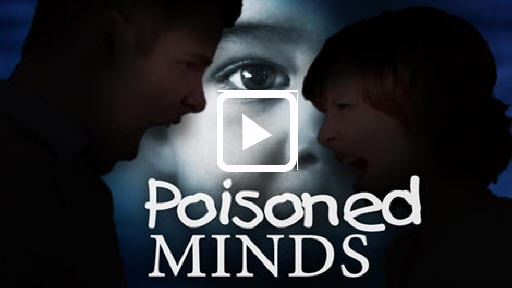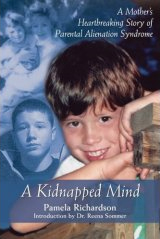Parental Alienation Syndrome (PAS): Sixteen Years Later
Academy Forum, 2001, 45(1):10-12 ( A Publication of The American Academy of Psychoanalysis ), by RICHARD A. GARDNER, M.D.
In 1985, the Academy Forum published my article, "Recent Trends in Divorce and Custody Litigation." This was the first article in which I described the parental alienation syndrome (PAS), a disorder that I began seeing in the early 1980s. The Forum article is generally considered to be the seminal publication on the PAS, parent to at least 100 peer-reviewed articles. Although this is certainly a source of gratification for me, the sixteen years that have ensued cannot be viewed as a straight path to glory, especially because of controversies that have swirled around the diagnosis. I address here the reasons for the controversies and provide suggested solutions.
The definition of the PAS I provided in the original article still holds:
The parental alienation syndrome (PAS) is a disorder that arises primarily in the context of child-custody disputes. Its primary manifestation is the child's campaign of denigration against the parent, a campaign that has no justification. The disorder results from the combination of indoctrinations by the alienating parent and the child's own contributions to the vilification of the alienated parent.
In the original article I described the primary symptoms of the PAS:
1) The Campaign of Denigration
2) Weak, Frivolous, or Absurd Rationalizations for the Depreciation
3) Lack of Ambivalence
4) The "Independent-Thinker" Phenomenon
5) Reflexive Support of the Alienating Parent in the Parental Conflict
6) Absence of Guilt Over Cruelty to and/or Exploitation of the Alienated Parent
7) Presence of Borrowed Scenarios
8) Spread of the Animosity to the Extended Family and Friends of the Alienated Parent
Further work with these families confirmed my original definition and description of the primary symptomatic manifestations. Initially, many were dubious about the existence of the disorder, some even considering my descriptions a caricature. Generally, the dubious were those who were not directly involved in working with families embroiled in child-custody disputes. By the late 1980s I was no longer hearing this criticism, so obvious was it that the disorder was widespread.
The Syndrome Issue
When critics no longer denied the existence of the disorder, they often heatedly claimed that PAS was not a syndrome. Campbell's Psychiatric Dictionary defines syndrome as:
A collection or grouping of disjunctive, variable signs and symptoms whose frequency of recurrence together suggests the existence of a single pathologic process or disorder that will explain them.
The PAS is one of the purest syndromes in psychiatry, especially the moderate and severe cases in which most if not all of the symptoms manifest themselves. Some claim that although PAS may be a syndrome, it is too early to apply the label, which should only be used after widespread acceptance. Such critics are not familiar with the traditional sequence used in psychiatry (and medicine in general) regarding the term syndrome. This sequence is also described in Campbell's Dictionary:
In general, three levels of categorization can be differentiated in medicine: (1) an isolated sign or symptom, without reference to associated features or cause, and with little predictive value. . . . (2) a clinical grouping of signs or symptoms into a distinctive syndrome. . . . (3) a distinctive clinical picture that is accounted for by an identifiable pathophysiologic process or etiologic agent.
Clinicians routinely see isolated symptoms. When a particular cluster repeatedly appears, then the syndrome term is justified. The first articles on a disorder, which may involve only a few cases, still justify the term syndrome because the authors are attempting to bring to the attention of professional colleagues their observations regarding the existence of the syndrome. And this has been true of other syndromes described in medicine and psychiatry, e.g., acquired immune deficiency syndrome (AIDS), Downs syndrome, and Tourettes syndrome. The sequence in psychiatry has been to change the name syndrome to disorder after repeated studies confirm its existence, especially when the etiologic agent has been identified. At such point the DSM changes the name from syndrome to disorder. For example, Tourettes syndrome became Tourettes Disorder when it first entered DSM-III in 1980. Similarly, Aspergers Syndrome became Aspergers Disorder when it entered DSM-IV in 1994.
When I first began seeing this cluster in the early 1980s, I discussed the question of the proper name with Dr. Robert Spitzer, then Chairperson of DSM-III and subsequently Chairperson of DSM-III-R. We both agreed that the term syndrome would be applicable at that point and that if subsequent research justified submission to a future DSM publication, then consideration would be given to changing the name to parental alienation disorder. In the early 1990s, when the DSM-IV committees were meeting, there were not enough articles on PAS to warrant submitting a proposal for inclusion in DSM-IV. (I will comment below on where things stand with regard to DSM-V.)
In my 1992 book on the PAS, I described what I considered to be the etiological factors that were operative and delineated the steps by which these factors contributed to the development of the disorder. Other examiners as well have described the same etiological factors and pathogenic mechanisms. Accordingly, I consider there to be good justification for my conclusion that Level 3 has been reached.
At this point, even the most zealous critics agree that there are children who have been programmed to be extremely alienated from a parent and fit the picture that I have described. They will even list the same cluster of symptoms. Yet, they still vigorously claim that the term syndrome is not justified. To the best of my knowledge, the main reason for the reluctance to utilize the term syndrome relates to the PASs admissibility in courts of law. As mentioned, the PAS arises almost exclusively in the context of child-custody disputes. Other syndromes that have been described in medicine and psychiatry are neither the result of litigation nor do they become a central issue in lawsuits. In courts of law, it often behooves an opposing attorney to not only discredit a new disorder, but even the person who has described it. Convincing the court that PAS is not a syndrome is a step toward getting the court to deny its existence entirely. If there is no PAS, then there is no PAS indoctrinator. Accordingly, those who call the phenomenon parental alienation will have an easier time in the courtroom than those who insist upon referring to the disorder accurately as the parental alienation syndrome.
The DSM-IV Issue
Another maneuver commonly utilized by attorneys is this: "PAS doesnt exist because its not in DSM-IV." This is the equivalent of saying in 1980 that AIDS does not exist because it is not in medical textbooks. The lawyers hope here is that the court will be naïve enough to buy into this argument and thereby support the position of the PAS-indoctrinating client who is denying the programming.
In spite of the reluctance of many to use the term PAS, at least 38 courts of law have recognized the PAS.
According to information I recently received from the APA, committees for considering newly described disorders will begin meeting in 2004-2005, with anticipated publication of DSM-V between 2007 and 2010. By that time, there will be many more than the 100 peer-reviewed articles and 38 legal citations that I now have to support consideration. (My list of publications and legal citations is being constantly updated and can be found on my website: www.rgardner.com/refs.) Those who avoid using PAS at this point are being shortsighted. Although they may benefit in court now by avoiding the word syndrome, they are reducing the likelihood of consideration by DSM-V committees.
PAS vs. Bona Fide Abuse
With increasing recognition of the PAS, a new phenomenon has developed. Specifically, parents who are truly abusive have been claiming that the childrens animosity toward them has nothing to do with their abuse but is the result of PAS programming by the other parent. This has become a common rationalization and diversionary maneuver for abusing parents. Some such parents have even been successful in convincing courts that they were not abusive and that the PAS is responsible for the alienation. Critics, then, claim that I am somehow responsible for this unfortunate situation. This is the equivalent of blaming Tourette and Downs when someone misdiagnoses the disorders they first described.
In an attempt to improve the diagnostic acumen of evaluators and to provide courts with proper differentiating criteria, I have a chapter devoted to the discrimination between PAS and bona fide abuse in the 1998 edition of my book on PAS. Examiners who carefully follow these guidelines should have little difficulty making this important differentiation, even though there are some cases in which PAS and abuse may coexist. When the abuse factor is clearly the predominant one, then the PAS diagnosis is not warranted.
The Sex-Abuse Issue
Since my residency days in the late 1950s, I have seen patients who were sexually abused as children. I believe that the vast majority of these descriptions have been valid. In the mid-1980s I began seeing a new phenomenon, namely, sex-abuse accusations by PAS children that were highly likely to be false. This was especially the case if the accusation emerged after the separation and after the failure of other PAS exclusionary manoeuvres. Most of the accusations were directed at fathers by mothers. In some cases, however, the programming father initiated the accusation against his ex-wife's new partner or husband. When I first started speaking about this, I was once again met with incredulity. "Children never lie," my critics said, "especially when claiming sex-abuse." Or I was sanctimoniously criticized for not "believing the children." My answer:
There are many things about these accusations that cause me to be very dubious about their validity. Some of them are patently preposterous, even impossible. There is often significant variation from one rendition to the next. Many include borrowed-scenario elements, taken directly from the programming parent. To believe these children is to believe that a father, in his 30s or 40s, switched his sexual orientation from straight heterosexual to pedophilia. Instead of denying this reality, we should develop criteria for differentiating between true and false accusations, especially because innocent people are now being jailed.
Subsequently, I gained extensive experience with such differentiation in accusations against teachers, scoutmasters, clergy, babysitters, neighbors, and adult women belatedly accusing elderly relatives of having sexually abused them in childhood. Experiences in these other realms enabled me to sharpen the criteria that I have used to differentiate between true and false sex-abuse accusations promulgated by PAS children. Although very few today wave the "Believe the Children" and "Children Never Lie" banners, we are still seeing false sex-abuse accusations, especially in the context of child-custody disputes.
The Recent Gender Shift in PAS Indoctrinators
In the early 1980s, when I first observed the PAS, mothers were the alienating parent in about 90% of the cases. Fathers were attempting to program their children, but they were less likely to be successful because the children were generally more closely bonded with their mothers. Accordingly, I still recommend that the mother be designated the primary custodial parent, even though she might have been a PAS programmer. Only in the severe cases (about 10 percent)--when the mother was relentless and/or paranoid--did I recommend primary custodial status to the father. Others, as well, recognized this gender disparity.
Although I was most often recommending that most mothers be designated the primary custodial parent--PAS indoctrinations notwithstanding--I was criticized as being "sexist" because I was stating that PAS indoctrinators were more often female than male. My answer to critics:
These are the facts. I am not alone in making this observation. Rather than just criticizing the person who describes the gender disparity, we should be looking into the reasons why women more than men are more likely to be indoctrinators.
My answer to this question has been that mothers are more likely to be the primary caretakers and so children are more likely to side with them in child-custody disputes. Because of this recognition, I still recommend that mothers, in most PAS cases, remain the primary custodial parent.
In recent years, I have seen a gender shift to the 50/50 ratio. Others are reporting a similarenon. Why this shift? One probable explanation relates to the fact that fathers are increasingly enjoying expanded visitation time with their children, providing fathers thereby with deeper bonding and more time to program them. Moreover, with increasing recognition of the PAS, fathers have learned about PAS indoctrination manoeuvres--especially the money and power factors. This shift notwithstanding, I still recommend mothers, much more often than fathers, as the primary custodial parent because in most cases the mother has been the primary caretaker and is more deeply bonded with the children.
During the late 1970s and early 1980s, when fathers began demanding primary custody, women would have done well to have argued that the real issue to be considered by the courts in child-custody disputes is not gender but bonding. Had women taken such a position, they could not be considered guilty of "sexism" and would have still enjoyed the benefits of being given preference in child-custody disputes. And the same preference would have been given to fathers who had been primary caretakers and more deeply bonded with their child than the mothers. Had the bonding principle been applied, the PAS probably would not have developed. Accordingly, the best way to prevent the PAS is for courts to give primary consideration to the bonding issue. Last, because more mothers now are becoming victims of PAS indoctrinations, it is likely that my work on the PAS will be received with greater receptivity by women.
The Rachel Foundation
Recently, The Rachel Foundation was established. Named after the biblical Rachel, who grieved over the loss of her children, the Foundation is devoted to research and assistance for PAS children. Particular attention is given to those who have been abducted in association with PAS indoctrinations. The Professional Advisory Committee consists of colleagues in both the mental health and legal professions who have had significant experience with PAS families. Further information about the Foundation can be found at www.rachelfoundation.org. The establishment of The Rachel Foundation is yet another outgrowth of the original article published in the Academy Forum 16 years ago.










